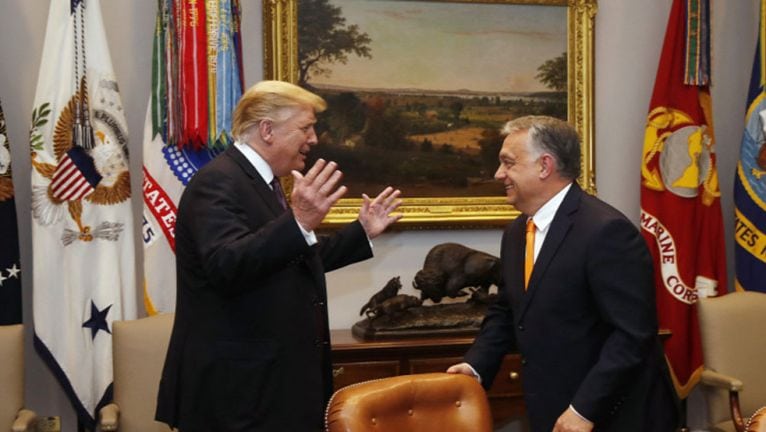
This week, months ahead of Hungary’s parliamentary elections set to take place in the springtime, former U.S. President Donald Trump released an official statement which he threw his support behind Prime Minister Viktor Orbán’s re-election bid.
In the statement, published on the website of the former U.S. president’s Save America super PAC, Trump commended Orbán for his strength and an unbreakable will to oppose Brussels’ globalists on every front, including their furtherance of mass migration, forced multiculturalism, migrant redistribution quotas, as well as their anti-family and anti-European policy positions.
“Viktor Orbán of Hungary truly loves his Country and wants safety for his people. He has done a powerful and wonderful job in protecting Hungary, stopping illegal immigration, creating jobs, trade, and should be allowed to continue to do so in the upcoming Election. He is a strong leader and respected by all. He has my Complete support and Endorsement for reelection as Prime Minister!”
The Hungarian prime minister is the second head of state to receive a coveted endorsement from the former president since he left office in January of 2021. Jair Bolsonaro, Brazil’s national-conservative president, also received a glowing reelection endorsement from Trump last October—one year ahead of the country’s planned presidential elections.
In the summer of 2020, before exiting the White House, Trump endorsed Polish President Andrzej Duda—another prominent national conservative on the world stage–just days before Poland’s presidential election. With Trump’s endorsement in hand, Duda went on to defeat his left-liberal challenger, Rafal Trzaskowski, despite the backing Trzaskowski enjoyed from the international liberal press.
The uniquely close relationship now shared by Trump and Orbán–two of the globe’s preeminent national conservative leaders–was initially forged in the summer of 2016, when the Hungarian Prime Minister became the first head of state in the European Union to openly endorse Trump’s bid for the presidency, which at the time had been regarded by most analysts as a political long shot at best.
Orbán recognized Trump’s stated foreign policy positions and orientation toward mass migration as “vital” for Hungary, while those held by his opponent—arch globalist Democrat Hillary Clinton—were “deadly.”
Months later in November, the nascent political bond was further bolstered—and the relationship was cemented for good—when the Hungarian prime minister became the first EU leader to congratulate Trump on his historic victory over Hillary Clinton, hailing the win as an unquestionably beneficial development on the world stage.
“Congratulations. What great news. Democracy is still alive,” the Hungarian prime minister wrote on social media on the morning after Trump had been deemed the victor.
In May 2019, President Trump welcomed the Hungarian Prime Minister to the White House’s Oval Office, where showed Orbán reverence, saying that he had “done a tremendous job in so many ways” and that he commanded respect across the European continent. “Probably like me a little bit controversial, but that’s okay. That’s okay. You’ve done a good job and you’ve kept your country safe,” Trump said.
For his part, Orbán said: “We are proud to stand together with the United States on fighting against illegal immigration, on terrorism and to protect and help the Christian communities around the world.”
And last summer, Trump once again reaffirmed his warm feelings and continued support for the Hungarian Prime Minister in a letter sent in response to one from Orbán: “Thank you for your beautiful letter and for your generous support and encouragement on behalf of the citizens of Hungary.”
May God bless you and may He continue to bless Hungary – Donald #Trump's letter to Viktor #Orban. He also praised the interview with @TuckerCarlson. pic.twitter.com/ziK0WZJ4Pu
— Mariann Őry (@otmarianna) August 31, 2021
“I am grateful for your continued friendship and enduring commitment to fighting for the ideals you and I cherish – freedom, patriotic pride, and liberty. Melania and I send our very best wishes to you, Anika, and your beautiful family. May God bless you and may He continue to bless Hungary.”
This spring, Orbán—Hungary’s longest-serving prime minister—along with his ruling national-conservative Fidesz party, will face what has been regarded as its strongest challenger in a decade: a unified six-party opposition coalition, led by Peter Marki-Zay. If successful, Orbán and his party will move on to their fourth consecutive term in office.
